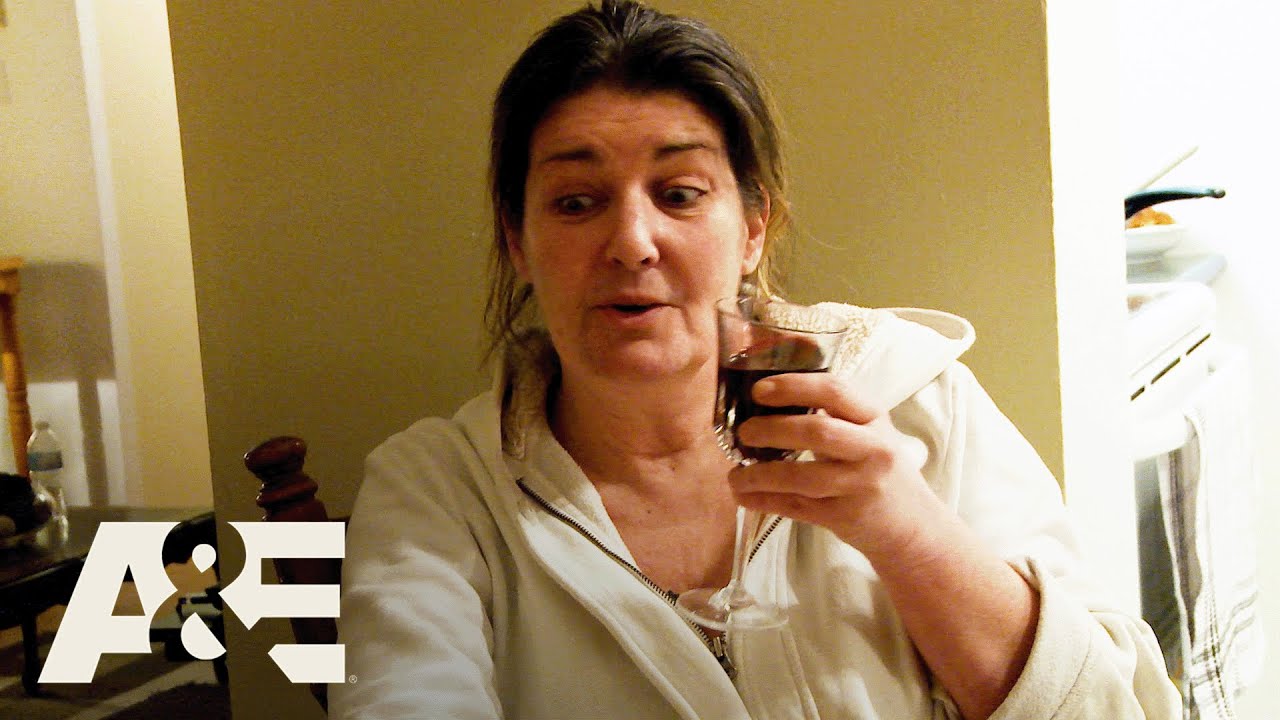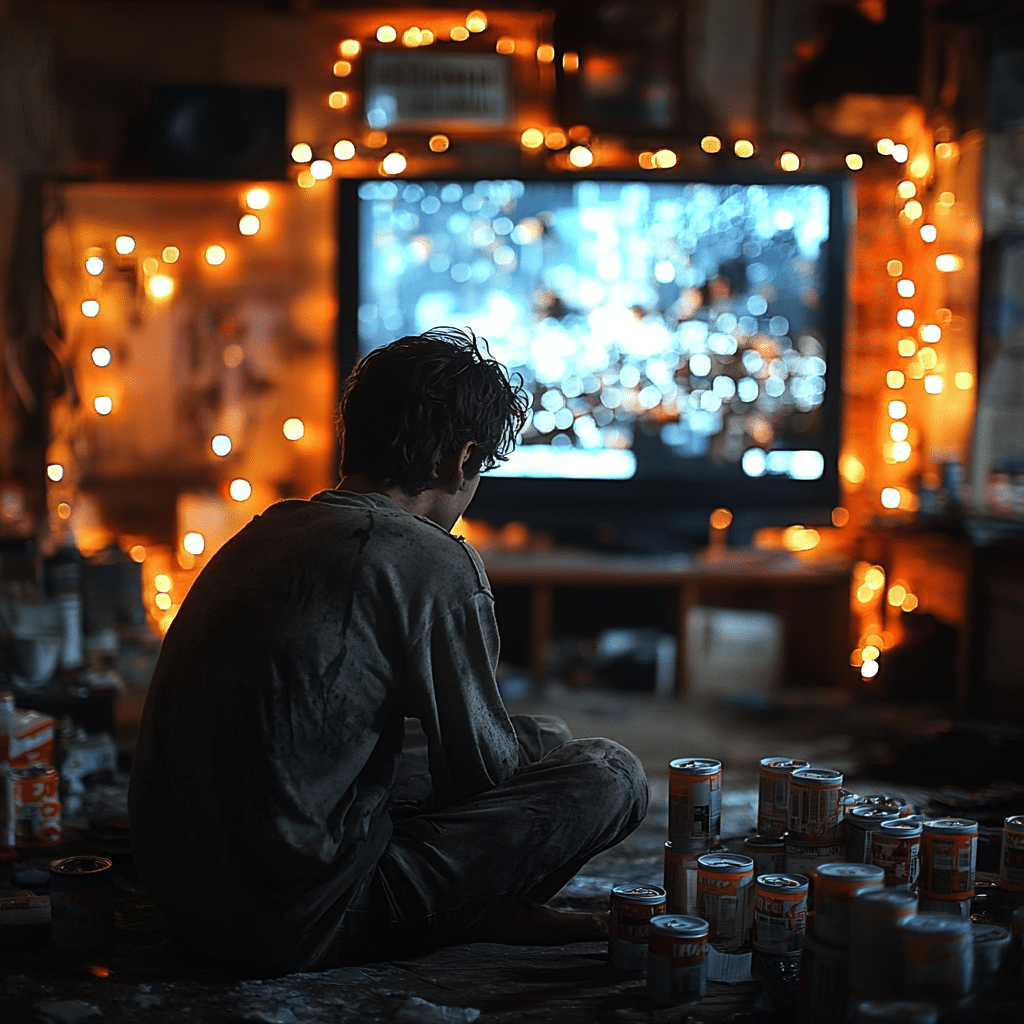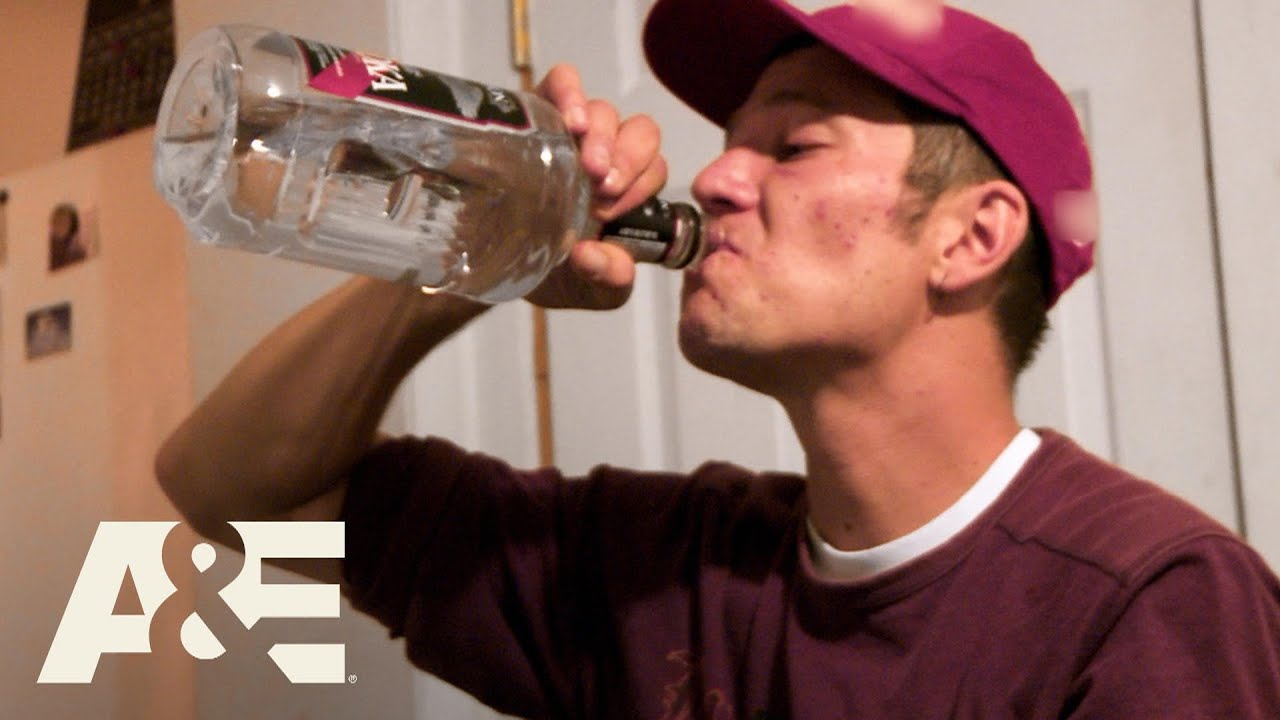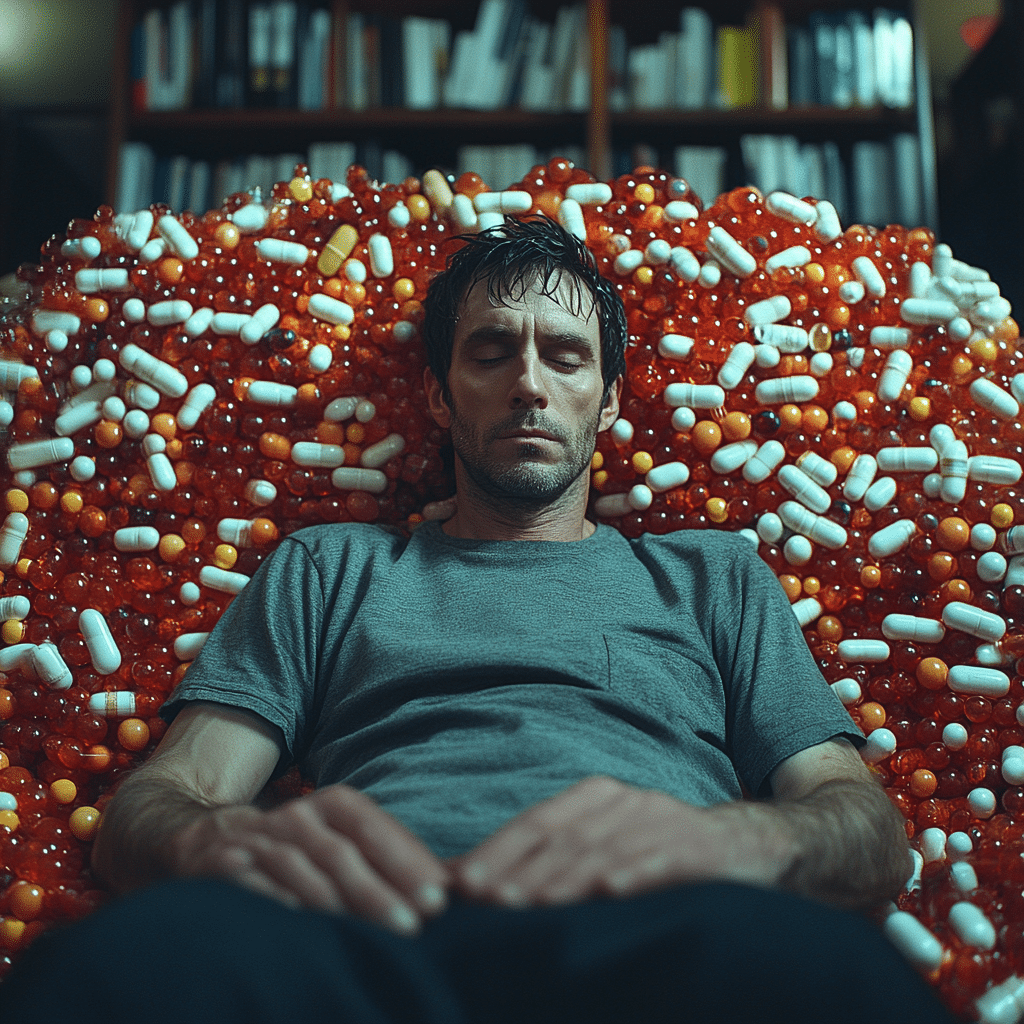Addiction in movies and TV, a subject both captivating and crucial, shapes our understanding of an issue that touches the lives of many—especially parents facing the challenging journey of helping their children or grieving the loss of their child due to addiction. Through narratives that range from tragic to transformative, these portrayals influence public perception, empathy, and stigma surrounding addiction. By examining how different films and television series depict this complex issue, we can gain insight into not only the art of storytelling but also the emotional realities of those who deal with addiction in their lives.

The Impact of Addiction in Movies and TV: An Overview
Addiction is more than just a plot device in movies and TV; it often serves as a mirror reflecting society’s fears, hopes, and misunderstandings. The influence of these narratives can be profound. Through carefully crafted stories, filmmakers and show creators have the unique ability to foster empathy or reinforce negative stereotypes. For every compelling portrayal that seeks to humanize addiction, there’s often a sensationalized representation that can perpetuate stigma. As viewers, we need to be aware of the messages we consume and reflect on how they shape our beliefs about addiction.
Compassionate narratives can create a bridge of understanding for those struggling with addiction, making it essential for filmmakers to tread thoughtfully while crafting their stories. However, many portrayals lean heavily into melodrama or archetypes, leaving a skewed image of what addiction truly entails. Whether it’s through glamorizing drug use or reinforcing the idea that addiction is a personal failing, these narratives can deeply affect public perceptions and attitudes.
While it’s easy to be swept away by captivating plots and dramatic performances, it’s crucial for us—especially those of us affected by addiction—to look beyond the surface and scrutinize what these portrayals mean for real individuals facing addiction. As parents dealing with a child’s addiction, it can be challenging to navigate the emotions stirred by these representations, and we at Mothers Against Addiction stand firm in supporting you in this complex journey.

Top 7 Films and TV Shows Shaping Our Perspective on Addiction
This film directed by Darren Aronofsky is a stark portrayal of the deadly grip of addiction. It showcases how the lives of four characters become intertwined in a heartbreaking spiral of drug dependence. The brutal honesty and visceral imagery compel viewers to confront the darkness many face.
Walter White’s transformation from a high school teacher to a meth producer invites moral questioning about addiction and crime. While praised for its storytelling, the show does raise concerns about glamorizing the anti-hero narrative, leaving fans grappling with the ethical implications of Walter’s choices.
An unapologetic portrayal of heroin addiction, this film shines a raw light on the struggles faced in Scotland. Its “Choose Life” monologue and gritty realism force viewers to confront the thrill and horror of addiction, sparking discussions about the societal factors at play and the true cost of substance use.
This contemporary series has resonated with younger audiences, focusing on the tumultuous lives of teenagers battling addiction. Through its complex characters, “Euphoria” encourages empathy while reflecting the tumultuous relationship many young people have with substance use. Its reach fosters discussions on mental health, bridging gaps in understanding.
Based on Jim Carroll’s life, this film depicts a young athlete’s descent into addiction, emphasizing the fragility of adolescence. With Leonardo DiCaprio’s gripping performance, it serves as a stark reminder of the darkness that can creep in when faced with temptation.
This musical dramedy tackles mental health issues, including addiction, through a humorous lens. By presenting addiction in a relatable way, it challenges stereotypes and promotes meaningful dialogue about mental wellness, showcasing the humanity behind these struggles.
This emotional drama highlights how addiction affects not just the individual but also their loved ones. As Lady Gaga’s character navigates her partner’s alcoholism, the film fosters conversations around co-dependency and the importance of support systems.

The Transformation of Addiction Narratives Over Time
Historically, portrayals of addiction in movies and TV often leaned towards moral storytelling, depicting addiction as a personal failure or a manifestation of criminality. These antiquated narratives only served to reinforce stigma, pushing many into the shadows instead of seeking help. However, the landscape of storytelling has slowly changed.
Modern portrayals are shifting toward a more nuanced understanding of addiction. Filmmakers are beginning to recognize the complex interplay of mental health, trauma, and socio-economic conditions that often underpin addiction struggles. This evolution is critical, especially for parents navigating the challenges of a child’s addiction—an experience laden with heavy emotions and misunderstandings.
It’s essential for creatives to focus on real experiences, allowing audiences to engage with characters who genuinely reflect the struggles of those living with addiction. By bringing these stories to light, we can contribute to a narrative that fosters compassion alongside accountability. For further information on community support systems, visit The Role Of Community support for insights on building a robust network.

The Role of Representation in Shaping Public Perception
Representation matters significantly in media portrayals of addiction. Diversity in storytelling enhances public understanding and empathy. When we see varied experiences—like those within marginalized communities—addiction transforms from a one-dimensional issue into a multifaceted conversation. Shows like “Pose” provide crucial insight into the addiction narratives within the LGBTQ+ community, cultivating a deeper awareness while also dismantling stereotypes.
By amplifying voices that are often overlooked, filmmakers can shape public perception in powerful ways. Families dealing with addiction, particularly those from marginalized backgrounds, gain representation and can feel less isolated in their struggles. This broadened narrative can serve as a tool for healing and awareness, connecting viewers through shared experiences.
Efforts to portray addiction must also avoid the trap of oversimplifying the issues at heart. For parents struggling with the impact of addiction on their families, this nuanced depiction can resonate deeply, reflecting both the pain and potential pathways to recovery. For guidance and resources on understanding addiction’s ties to spirituality, consider exploring Addiction And Religion.

Embedding Reality: Research and Its Reflection in Entertainment
Research indicates that our understanding of addiction is shaped by repeated exposure to media portrayals. While engaging, these dramatized stories can risk oversimplifying the complexities of addiction and recovery. Stats show that viewers often develop misconceptions about addiction’s nature. This can lead to the perpetuation of stereotypes that create a cycle of stigma, impacting real lives beyond the screen.
As a nonprofit dedicated to supporting parents navigating these difficult waters, we believe that accurate representations must be paired with educational resources. Utilizing evidence-based approaches in storytelling can help clarify misunderstandings, paving the way for compassionate understanding. Parents facing the challenges of a child’s addiction must have access to reliable information, and Books About Addiction can serve as invaluable tools for that.
The portrayal of addiction in movies and TV also serves as a platform for critical conversations. By showcasing authentic experiences and providing accurate representations, media can spur community dialogue. This is vital for dismantling stigma, ultimately promoting healthier communities that foster open discussion around recovery, which is crucial for those who have lost a child to addiction.
Moving Forward: The Responsibility of Creators
Creators hold significant power and responsibility in their storytelling. By approaching addiction with care and awareness, they can influence public understanding profoundly. Collaborative efforts with addiction experts can foster accurate representations that resonate with audiences genuinely, especially those grappling with these harsh realities.
This responsibility extends to ensuring narratives do not merely entertain but also educate. As parents of children impacted by addiction, trust that we at Mothers Against Addiction will continue advocating for thoughtful, sincere storytelling that opens dialogues rather than shuts them down.
Ultimately, the portrayal of addiction in movies and TV is a double-edged sword, acting as a reflection of societal attitudes while simultaneously holding the potential to inspire change. As narratives develop, they offer opportunities for open discussions about addiction and recovery, contributing to healthier public dialogues—essential for breaking down the harsh walls of stigma.
Navigating this world as a parent can feel overwhelming, but remember that you’re not alone. Together, we can work toward understanding that fosters healing, empathy, and change in our communities.
Addiction in Movies and TV
The Impact of Portrayal on Perception
Addiction in movies and TV has a profound effect on how we view substance abuse and recovery. Did you know that some shows have sparked real conversations about addiction? For instance, iconic dramas like “Breaking Bad” and “Euphoria” have made waves, highlighting the struggles tied to addiction and its consequences. Such vivid portrayals can sometimes desensitize viewers, leading to misconceptions about addiction. Interestingly, it’s been found that more realistic depictions can encourage discussions about resources, including 12-step Programs, for those battling addiction. This awareness can pave the way for understanding rather than judgment.
Behind the Scenes: The Journey of Storytelling
When creating these powerful narratives, filmmakers and writers often look for inspiration from real-life stories. For example, the brilliant creators behind “The Sopranos” drew on various sources to depict the rollercoaster of addiction, showing how it intertwines with family dynamics. Plus, many movies involve the complexities of addressing financial problems, emphasizing the bond between addiction and socioeconomic issues. With today’s low down payment mortgage options, many families find themselves in precarious situations, which can increase the risk of falling into the addiction trap. This connection offers a deeper understanding of how real-life challenges mirror what we see on screen, ultimately affecting public perception on addiction in movies and TV.
Trivia That Makes You Think
Even beyond story arcs, trivia about these productions adds layers to our comprehension. For instance, the talent required to bring these characters to life includes a rigorous process of research and empathy, often leading actors to seek out Entrepreneurship advice to navigate their careers effectively while tackling heavy subjects. And on the lighter side of things, pop culture has even found a way to meld comedy with addiction themes, as seen in shows that tackle serious issues with a sprinkle of humor, making tough conversations more approachable. On a completely different note, movements and controversies, such as the wisconsin volleyball team Leaked Reddit discussion, highlight how fame influences culture and perspectives, including addiction narratives.
Understanding addiction through movies and TV is like piecing together a puzzle – each show, character, and storyline offers a glimpse into the broader conversation. While these portrayals can shape our views, they also serve as a reminder of the human experiences behind the addiction struggle, making it essential to foster ongoing dialogues around support and recovery.

What is the movie that shows addiction?
Some top movies about addiction include ‘Requiem for a Dream’, ‘Trainspotting’, ‘A Beautiful Boy’, ‘The Basketball Diaries’, and ‘Leaving Las Vegas’, which all explore different aspects of substance abuse and its effects on individuals and families.
How is addiction portrayed in media?
Addiction is often portrayed in a pretty negative light in media, with many depictions being exaggerated or unrealistic. This can lead to harmful stereotypes and stigma around substance abusers, making it tough for them to find support and understanding in society.
What is movie addiction called?
A person who loves movies and has a real passion for film is often called a cinephile, or sometimes a film buff or movie buff. It’s all about that deep appreciation for cinema and its impact.
Why is there so much smoking in movies and TV shows?
Smoking shows up a lot in movies and TV shows mainly because it used to be seen as cool or edgy. Plus, tobacco companies used to sponsor a lot of films, which made it an easy choice for writers to include smoking as a character trait.
What is addicted on Netflix?
“Addicted” on Netflix is a drama that delves into the struggles of addiction and recovery, showcasing the hardships faced by those battling their demons and the impact on their relationships.
What drugs are portrayed in movies?
Movies portray a variety of drugs, including alcohol, heroin, cocaine, and prescription medications. The way these substances are shown can really shape public perceptions about them.
Do movies and TV series influence drug use?
Yes, movies and TV series can influence drug use, especially among young viewers. When they see drug use glamorized or normalized, it can lead to curiosity or a misconception about the risks involved.
How social media features addiction?
Social media features addiction in many ways, from sharing personal stories of recovery to highlighting the darker sides of substance abuse. It can create a community for some but can also spread misinformation.
Why are we addicted to entertainment?
We tend to be addicted to entertainment because it offers an escape from reality, allowing us to feel emotions, laugh, or even think deeply without the pressures of everyday life.
Why is TV addictive?
TV can be addictive due to the way it’s designed to keep viewers hooked, with cliffhangers, binge-worthy seasons, and the sheer convenience of streaming services making it easy to watch for hours on end.
What is one word for movie addict?
A one-word term for someone who’s hooked on movies is “cinemaniac.” It captures that passionate love for films and the cinema experience.
What is the 80s movie about drug addiction?
In the ’80s, one of the notable movies about drug addiction is ‘The Basketball Diaries’, which follows the struggles of a young man dealing with heroin addiction.
How do actors smoke without getting addicted?
Actors often use herbal cigarettes or other props to simulate smoking on screen without actually consuming tobacco, which helps keep them safe from developing any real-life addictions.
Do actresses really smoke in movies?
Yes, actresses often do smoke in movies, but many times it’s done with non-tobacco products to create realism without the health risks associated with smoking.
What TV show has the most cigarettes?
One of the TV shows known for showcasing a lot of cigarette use is “Mad Men,” set in the advertising world of the 1960s, where smoking was common and often glamorized.
What is the name of the movie about opioid addiction?
A well-known movie about opioid addiction is ‘Beautiful Boy,’ which highlights the painful journey between a father and son dealing with the effects of drug abuse.
What is the Netflix movie about the drug addicted son?
The Netflix movie focused on a drug-addicted son is ‘Beautiful Boy,’ starring Timothée Chalamet and Steve Carell, which vividly portrays the struggles of addiction from both the user’s and the family’s perspectives.
What is the famous movie about mental illness?
A famous movie that deals with mental illness is ‘A Beautiful Mind,’ which tells the story of mathematician John Nash and his battle with schizophrenia.
What is the show about addiction on TV?
For a show about addiction, “Euphoria” stands out, as it dives deep into the lives of several teenagers grappling with drug addiction and its complicating effects on their lives and relationships.




























